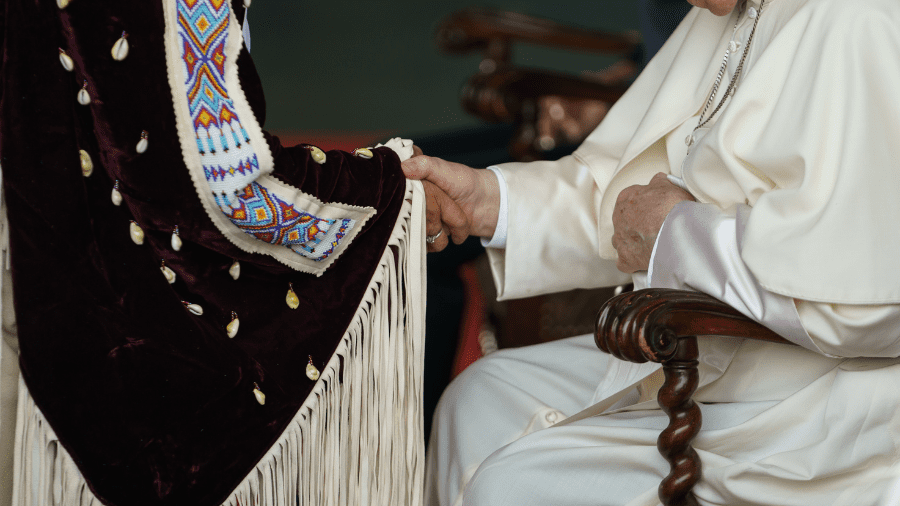By Chris Sankey, September 30, 2022
For the last few years, a small number of Indigenous activists and self-declared “allies” of Indigenous peoples have relentlessly attacked Canada’s past. They defaced the statues of leading Canadian political figures, including John A. Macdonald and Edgerton Ryerson. They demanded the removal of “colonizer” names from public buildings (Langevin Block in Ottawa) and a university (Ryerson again). A few even used the occasion of Queen Elizabeth’s death to call her out as a murderer and colonizer.
These kinds of pressures convinced Pope Francis to come to Canada to give a series of high-profile public apologies about the Church’s role in Indigenous residential schools. The Pope’s events attracted international attention – and brought thousands of Indigenous peoples together to hear his words and be in the presence of one of the most powerful religious leaders in the world.
These folks are loud, assertive, and they know how to get media attention. A pint of red paint easily gets more coverage than violence in a First Nation community, an Inuit suicide, or extreme poverty in a northern region. The public likes theatre and the activists give it to them. The anger and frustrations expressed by these folks are real, even if their sense of history and responsibility are often shaky.
But will it make a difference? Perhaps, over many years, if attitudes and perceptions actually do change in a positive manner. In the short-term, I do not see much potential. In fact, the current style, intensity and rhetoric of the activists are increasing tensions in the country, generating considerable pushback and alienating potential supporters by politicizing history and offering simplistic explanations for complex historical processes. If reconciliation is about bringing people together and finding common ground, the activists’ approach is sowing anger and division.
First Nations, Métis and Inuit people across the country face real and serious problems. While there are promising developments in certain areas – Indigenous self-government, business, cultural revitalization, artistic production and infrastructure – the realities are worrisome. Far too many Indigenous peoples are poor, face ongoing discrimination, live in communities with a weak economic foundation, struggle to maintain language and culture, and seek to capitalize on expanding Indigenous legal and treaty rights.
But these more fundamental issues, wrapped up the rhetoric of colonization and decolonization and the self-satisfied rhetoric of anti-racism, are lost in the fog of virtue signalling, box-ticking land acknowledgements, and attacks on the historical symbols of colonization. Not many of the noisy activists stand with us when our elders pass away, our young people commit suicide, our adults fill the jail cells, or when our children go to bed hungry in over-crowded and poorly built houses.
All too often, environmental activists use our communities and cultures as a foil against major resource and infrastructure projects. Our people urgently need jobs, income, and local investment. Indigenous communities have considered the environmental and socio-cultural risks and benefits at length. A substantial majority (at least 65 percent by recent polls) are in favour of carefully developed resource projects that respect Indigenous and treaty rights and provide appropriate returns to the community.
Yet instead, many environmentalists ignore the wishes of the Indigenous majority and, purporting to speak for Indigenous peoples, publicly declare widespread Indigenous opposition to resource and infrastructure projects.
The Pope’s visit brought even greater attention to Indigenous affairs. But like so many past protests and actions, it created a lot of buzz, many fine and even kind words, but little concreate actions – and precious few proposals. The results are vague promises to do better, yet another layer of apologies, and no substantial strategy for addressing underlying and deeply entrenched socio-economic challenges. Far too often, reconciliation has been about non-Indigenous peoples coming to term with their histories, assuaging their guilt, and improving their understanding of Canadian realities.
In the end, many Indigenous peoples were unmoved by the Pope’s apologies and statements. They came far too late and too reluctantly. They lack precision, failed to tackle some of the broad issues of European domination, and did not commit the Catholic Church to specific actions. Importantly, Indigenous peoples have heard this all before. For some 40 years, non-Indigenous peoples have been feeling badly about our poverty and hardships. They, like the Pope, understand our pain and even understand the role of Europeans and colonizers in causing our distress. Enough already.
First Nations do not need apologies. They do not need the leader of the Roman Catholic Church to talk about what the Church did to us over the past several centuries. They do not need non-Indigenous peoples trying to exorcise their demons and to feel better about themselves. Our needs are simple.
First Nations need – and deserve – the same quality of local infrastructure that other Canadians take for granted. Government services, in health and education, should be at national standards. Because the Indian Act has messed our land tenure systems, our housing and land ownership arrangements need major reworking. But this need not result in over-crowded, poorly constructed and ridiculously expensive houses. We must share in the nation’s economic prosperity and we deserve the use and enjoyment of our lands and resources.
Pope Francis came to Canada, he spoke, and he apologized. And our communities still have poor water, widespread poverty, cultural loss, too few jobs and little control over our territories. There are much better approaches than obsessing about the past and worrying about statues, apologies and renaming buildings. Let us focus on expanded Indigenous autonomy, building community economies, revitalizing language and culture and improving the quality of life.
Apologies, even from the Pope, are primarily for and about non-Indigenous peoples and societies. They do not address the issues that really matter to First Nations, Métis and Inuit people and communities in Canada.
Chris Sankey is a former elected councillor for Lax Kw’ Alaams Band, a business leader and a Senior Fellow at the Macdonald-Laurier Institute.






